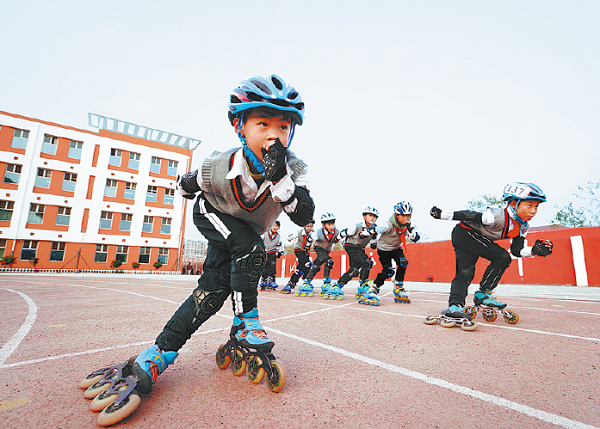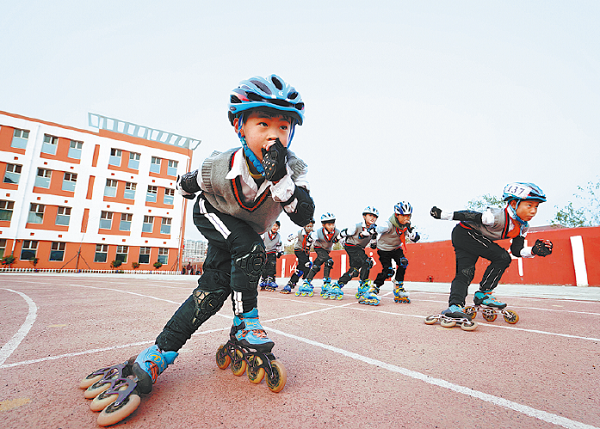
Students practice roller-skating on Tuesday at Xinxiguan Primary School in Neiqiu county, Xingtai, Hebei province. Students have a number of options for extracurricular activities including calligraphy, sports and dance, which aim to give them a healthier development. [Photo/Xinhua]
Ministry says significant progress seen in reducing academic burdens
More than 80 percent of academic tutoring institutions have closed down or switched to other fields of business due to ongoing efforts to reduce the excessive academic burden on primary and middle school students, the Ministry of Education said on Tuesday.
Significant progress has been made in regulating the after-school tutoring market and the number of academic tutoring institutions has been considerably reduced, it said.
The number of online academic tutoring institutions has been slashed by 84.1 percent, and the number of offline ones by 83.8 percent, it said, adding that any remaining tutoring institutions should be turned into nonprofit ones or closed.
Advertising by tutoring companies has been basically stamped out and capital investment in such companies has also been withdrawn, the ministry said.
A guideline issued in July by the general offices of the Communist Party of China Central Committee and the State Council, China's Cabinet, said the number of tutoring institutions should be gradually and significantly reduced and remaining curriculum-based tutoring institutions for primary and middle school students should register as nonprofit organizations.
Hao Kuigang, deputy director of the Tianjin Municipal Education Commission, said there are no longer any online academic tutoring institutions in the city and the number of offline ones had been reduced by 92 percent by Monday.
All remaining tutoring institutions have become nonprofit organizations, he said.
Guo Yihao, director of the Nantong education bureau in Jiangsu province, said the number of academic tutoring companies in the city has been reduced from 765 to three, with 491 being closed and 271 switching to other business.
Lyu Yugang, director of the Ministry of Education's department of basic education, said almost all primary and middle schools now offer two-hour after-school service on weekdays to meet students' needs for all-around development.
A survey by the ministry found that 92.7 percent of the schools have opened after-school arts and sports activity classes, 88.3 percent offer reading as an after-school activity, and 87.3 percent are conducting interest groups and clubs, he said.
The percentage of students taking part in after-school services has increased from 49 percent last semester to 92 percent this semester, Lyu said, adding that more than 3 million students participated in the day care service provided by 210,000 schools during the summer vacation.
More than 99 percent of schools have issued homework management rules and more than 90 percent of students can finish their written homework in the set time, up from 46 percent before the central guideline was introduced, he said.
Lyu said that in a survey conducted by the National Bureau of Statistics, 73 percent of parents said their children's homework had been markedly reduced and 85 percent said they were satisfied with the after-school service offered by schools.
Schoolteachers have assumed more responsibility since the central guideline was issued and the ministry will make the utmost efforts to hire more teachers, while also encouraging schools to introduce flexible working hours for teachers, he added.






